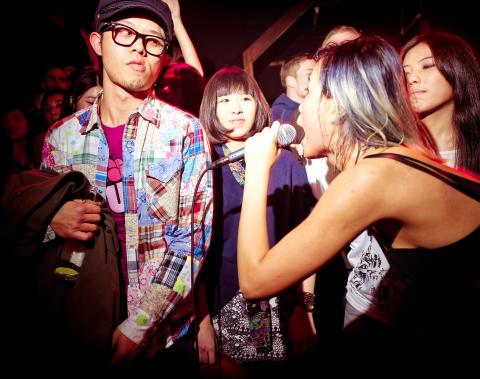Don’t let the old sign outside fool you: The Source has changed ownership and reopened with the new, but not yet official name of Revolver.
Gone is eight years’ worth of grime, and the walls now sport a swanky red paint job. The two new owners, Brits Jeremy Gray and Leroy Ransom, are planning a formal opening toward the end of this month when they will put up a new sign, but haven’t yet settled on a date.
Gray and Ransom got Revolver underway with a soft opening in the middle of last month. Downstairs a revamped bar serves beer (NT$100) and spirits (NT$150 per shot), while the dance floor/live music space takes up the second floor, and the third floor retains its pool table.

Photo Courtesy of Joe Russo
A lot of work was put into the sound system, including new speakers and equipment for DJs and bands.
“We put in a 24-channel mixing desk, an EQ with big new speakers that have 15-inch tops, with the sub to be put in soon,” said Gray, adding that wiring would be installed so the music from bands and DJs could be pumped upstairs and downstairs.
The venue has a complete drum kit, amplifiers and PA system, allowing musicians to just show up, plug in and rock out.

Photo Courtesy of Joe Russo
Despite a few loud parties since opening, Gray said that noise complaints shouldn’t be a problem.
“We had one complaint on opening night from one of the neighbors in the back, but that’s all,” Gray said.
Following that complaint, the owners installed heavy doors in the back stairwell to reduce the noise. The doors take a good shove to open or close because of their almost hermetic seal, meaning the neighbors aren’t likely to be bothered by the good vibes. For those who want to gather outside, there’s a covered area out front with tables and sofas. “We could practically have a rave out there and it wouldn’t bother anybody,” Gray said.

Photo: Steven Vigar
The bar formerly known as The Source is located at 1-2, Roosevelt Rd Sec 1, Taipei City (台北市羅斯福路一段1-2號), near Chiang Kai-shek Memorial Hall MRT Station (中正紀念堂捷運站) Exit 4. Call (02) 3393-1678 for details.
See The Vinyl Word

April 28 to May 4 During the Japanese colonial era, a city’s “first” high school typically served Japanese students, while Taiwanese attended the “second” high school. Only in Taichung was this reversed. That’s because when Taichung First High School opened its doors on May 1, 1915 to serve Taiwanese students who were previously barred from secondary education, it was the only high school in town. Former principal Hideo Azukisawa threatened to quit when the government in 1922 attempted to transfer the “first” designation to a new local high school for Japanese students, leading to this unusual situation. Prior to the Taichung First

When the South Vietnamese capital of Saigon fell to the North Vietnamese forces 50 years ago this week, it prompted a mass exodus of some 2 million people — hundreds of thousands fleeing perilously on small boats across open water to escape the communist regime. Many ultimately settled in Southern California’s Orange County in an area now known as “Little Saigon,” not far from Marine Corps Base Camp Pendleton, where the first refugees were airlifted upon reaching the US. The diaspora now also has significant populations in Virginia, Texas and Washington state, as well as in countries including France and Australia.

On April 17, Chinese Nationalist Party (KMT) Chairman Eric Chu (朱立倫) launched a bold campaign to revive and revitalize the KMT base by calling for an impromptu rally at the Taipei prosecutor’s offices to protest recent arrests of KMT recall campaigners over allegations of forgery and fraud involving signatures of dead voters. The protest had no time to apply for permits and was illegal, but that played into the sense of opposition grievance at alleged weaponization of the judiciary by the Democratic Progressive Party (DPP) to “annihilate” the opposition parties. Blamed for faltering recall campaigns and faced with a KMT chair

Article 2 of the Additional Articles of the Constitution of the Republic of China (中華民國憲法增修條文) stipulates that upon a vote of no confidence in the premier, the president can dissolve the legislature within 10 days. If the legislature is dissolved, a new legislative election must be held within 60 days, and the legislators’ terms will then be reckoned from that election. Two weeks ago Taipei Mayor Chiang Wan-an (蔣萬安) of the Chinese Nationalist Party (KMT) proposed that the legislature hold a vote of no confidence in the premier and dare the president to dissolve the legislature. The legislature is currently controlled